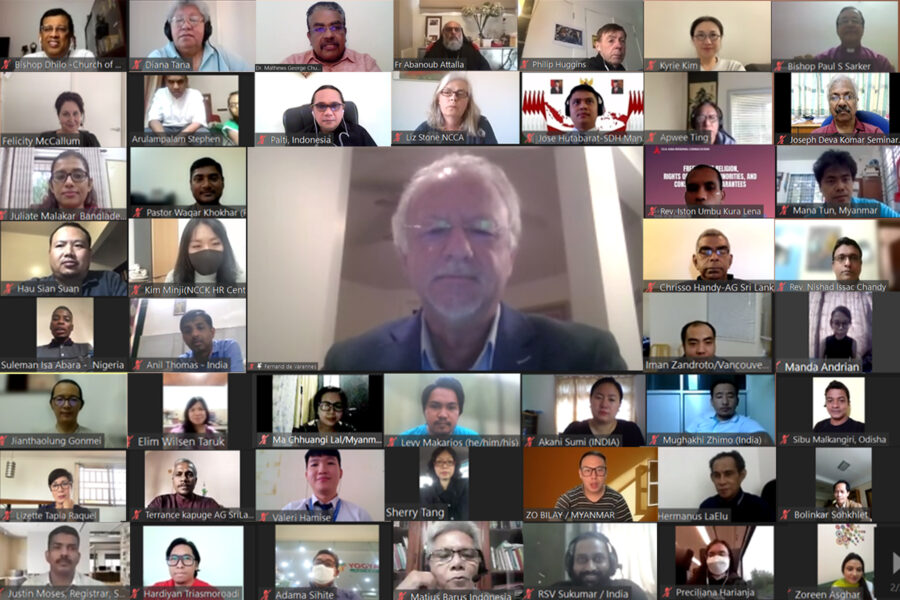UN Special Rapporteur encourages Asian churches to increase engagement with UN
 Participants of Asia Regional Consultation on 'Freedom of Religion, Rights of Religious Minorities, and Constitutional Guarantees in Asia'
Participants of Asia Regional Consultation on 'Freedom of Religion, Rights of Religious Minorities, and Constitutional Guarantees in Asia'
The United Nations (UN) Special Rapporteur on Minority Issues, Dr Fernand de Varennes, encouraged Asian churches to increase their engagement with the UN as part of their advocacy to promote minority rights.
Dr Fernand de Varennes addressed the participants on ‘Minority Rights: Understanding Asia’s Majority-Minority Contexts’ on the last day of the Christian Conference of Asia’s (CCA) Asia Regional Consultation on ‘Freedom of Religion, Rights of Religious Minorities, and Constitutional Guarantees in Asia’.
Dr de Varennes provided an overview of the development and origin of human rights after the horrors of World War II, saying that humanity was then convinced ‘that the rule of majority has to answer to greater moral and ethical authority of international human rights systems’.
He was of the opinion that ‘the rulers, or majority in states could not be allowed to cross a certain line to commit genocide, atrocities, or other violations of human rights which were fundamentally against dignity, equality, justice, and peace’. However, Dr de Varennes also noted the massive increase in global violence against those belonging to religious minorities.
“We have reliable data that indicates three-fourth or more victims of hate speech and hate crimes are members of religious, ethnic, or linguistic minorities. At the same time, nationalist majority rhetoric has taken a sharper edge with politicians instrumentalising widespread fears and uncertainties in an unstable world for short-term political gain, to demonise and scapegoat minorities as the enemies, as criminals, as threats to social order,” he said.
“The main threats and challenges to peace and the drivers of instability usually involve non-respect for the human rights of minorities, particularly practices which are discriminatory or deny fundamental rights, such as the freedom of religion,” Dr de Varennes emphatically stated while referring to the disproportionate victimisation of the Rohingya Muslims in Myanmar, the Shia in Yemen, the Hazara in Afghanistan, the Kashmiris in India, and the Muslims and Christians in Sri Lanka.
Speaking of the interrelations between the trampling of minority rights and statelessness, Dr de Varennes informed the participants that 75 percent of the world’s stateless people belonged to minority groups, and that despite the UN’s campaign to eradicate statelessness by 2024, the opposite was happening.
Dr de Varennes pointed out how digital spaces and online media were unequal spaces and were becoming ‘angrier, violent, and toxic places for minorities’.
“Algorithms create rabbit holes, amplifying prejudice, and the COVID-19 pandemic is escalating this violent rhetoric. The unfortunate and unhealthy side of social media is that harmful and mis-informative content can go viral in a matter of minutes to spread to millions of people before platform owners can act to mitigate effects. What is not sufficiently explored is that minorities are most vulnerable on social media and so are easily outnumbered, flooded, and threatened. Social media operates in favour of the largest number, encouraging majority extremism—rewarding the greatest number of shares, clicks, likes, and so on,” he said, while adding that social media had played a widely acknowledged role in atrocities and the attempted genocide against the Rohingya in Myanmar, against the Muslim minority in Sri Lanka, and had contributed to the increase in mob lynching in India.
The UN Special Rapporteur further reviewed the endeavours of the UN towards the protection of minorities.
“Currently, there is a very noticeable reluctance on the part of the UN to talk about minorities. Several initiatives of the UN are not very demanding and are only advisory. We need to have our voices heard as often as possible at UN platforms and contribute our understanding and knowledge in this hostile context.”
“Immediate engagement would be timely as we commemorate the 30th anniversary of the Declaration on the Rights of Persons belonging to National or Ethnic, Religious and Linguistic Minorities in 2022. There are several activities to launch a number of initiatives, including a regional forum for Asia and the Pacific to be held in Malaysia in 2022. Such international mechanisms are needed more than ever,” concluded Dr de Varennes.
The CCA’s Asia Regional Consultation on the ‘Freedom of Religion, Rights of Religious Minorities, and Constitutional Guarantees in Asia’ held from 5–8 October 2021 was attended by around 50 representatives from the CCA’s member councils, churches, and partner organisations from across Asia.











